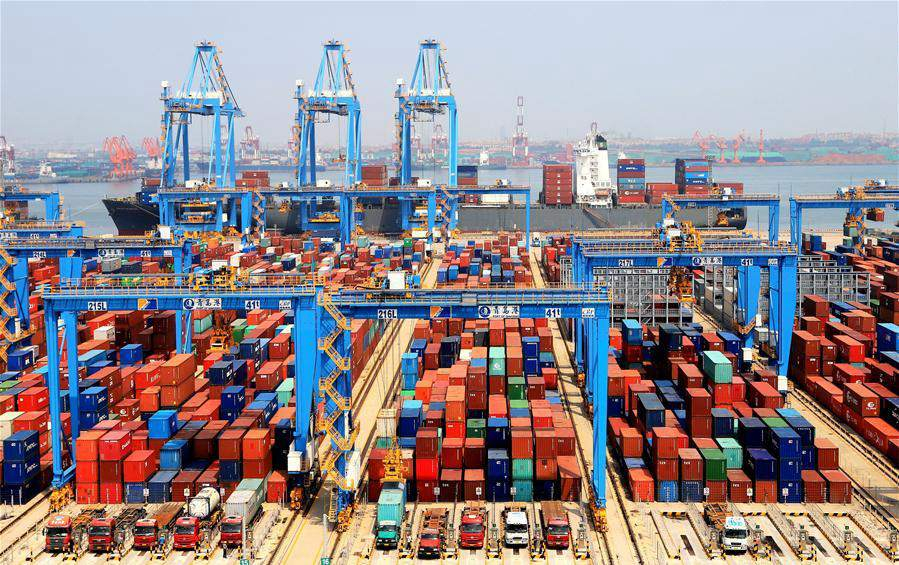
A man passes by a signboard for Shanghai E-port in Shanghai, east China, August 12, 2018. /Xinhua Photo
A man passes by a signboard for Shanghai E-port in Shanghai, east China, August 12, 2018. /Xinhua Photo
Editor's Note: Zhu Zheng is an assistant professor focusing on constitutional law and politics at China University of Political Science and Law. The article reflects the author's opinions, and not necessarily the views of CGTN.
China's new Foreign Investment Law (FIL) came into effect on January 1, 2020. According to the National People's Congress, the updated legislation aims to further open China's market to the world, and level the playing field for foreign enterprises. But will this goal be achieved?
Western commentators probably will give a negative answer. Almost all of them welcomed China's willingness to open up the market, but some argued that the law will have little impact on the overall economy.
They merely view the law as a Band-Aid solution. They noted that the law is a piece of expedited legislation, which was passed only some months after it was put onto the agenda. They perceived the law in the context of the ongoing China-U.S. trade war, seeing it as something hammered out to comfort Washington and its allies.
Moreover, the analysts complained that the law is too vague, and there exists only "a kind of sweeping set of intentions" but lacks "a specific, enforceable set of rules".
Indeed, from the first draft released for comment to the final document ready to take effect, it only took three months. And the law-making process was somehow accelerated in comparison with the old version of the FIL, which took years to finish.
However, it is worth noticing that the FIL is only one of a set of enactments that was in the making at the same time. Apart from the FIL, there's a new Antitrust Law being released for comments and the Regulation on Optimizing the Business Environment that took effect since January 1.
The revised Antitrust Law aims at preserving free and unfettered competition and protecting consumers from predatory business practices, whereas the Regulation, as an administrative regulation made by the State Council, is to prohibit plans to fix prices, divide markets or rig bids, so as to assure that there exists sufficient incentives for businesses to thrive.
Hence, the overall objective of the recent legal revision is to level the playing field and to remove trade barriers, not just for foreign investors, but also for all economic entities. Seen in this light, the efforts of the Chinese government are to address some local concerns, rather than threats from abroad.

An automatic container dock in Qingdao, east China's Shandong Province, May 16, 2018. /Xinhua Photo
An automatic container dock in Qingdao, east China's Shandong Province, May 16, 2018. /Xinhua Photo
One concern that stands out is the inconsistencies among the laws. From 1979 to 1990, there have been three different laws regulating foreign investment in China, which included the Sino-Foreign Equity Joint Ventures Law, the Sino-Foreign Contractual Joint Ventures Law, and the Wholly Foreign Owned Enterprises Law.
While the three investment laws have genuinely attracted foreign investments at the early stage of the reform and opening-up, they have lagged behind the times and could not fully cover what is happening in reality.
For example, the laws were not effectively addressing merger and acquisition in the capital market, and as China has been making a progress in its financial sector by making use of digital tools, some critical forms of investment were not included in the three investment enactments.
For these reasons, some measures were introduced to address the concerns, with a free trade zone established along coastal cities and the administrative process streamlined to ease the worries of the overseas investors. Yet these measures merely scratched the surface of the problems, leaving many fundamental issues unmarked.
In order to find a more comprehensive solution, the new FIL law for the first time adopted the negative list approach by identifying areas where foreign investment is restricted and leaving sectors outside of the list opened for foreign money. At the same time, the new law sets out a timetable for opening-up the finance and other industries, putting foreign enterprises on the same footing.
Along with the aforementioned Antitrust Law and the Regulation, the FIL mapped out a clear route for further reforms. For example, some serious promises were made to attract more foreign investments in the automobile, agricultural and energy sectors, and banking and insurance markets will be gradually opened, removing procedural requirements such as obliging a foreign insurance company to maintain a representative office in China for two years before establishing an insurance branch.
Therefore, it can be concluded that China's new FIL is one of many steps to gradually reform the economy and to further open up the market to the overseas investors. The new law is not a makeshift plan, but a long-term commitment.
(If you want to contribute and have specific expertise, please contact us at opinions@cgtn.com.)